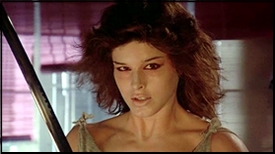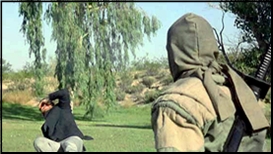Tue 24 May 2022
A Movie Review by Jonathan Lewis: NINJA III: THE DOMINATION (1984).
Posted by Steve under Action Adventure movies , Reviews[3] Comments

NINJA III: THE DOMINATION. The Cannon Group/Golan-Globus Productions, 1984. Shô Kosugi, Lucinda Dickey, Jordan Bennett, David Chung, Dale Ishimoto, James Hong. Screenwriter: James R. Silke. Director: Sam Firstenberg.
Cinema takes different forms. Some movies are certainly a high art form; others are lowbrow popcorn fare. Then there’s Ninja III: The Domination, which I got to see as part of Cinematic Void’s presentation in conjunction with American Cinematheque. Released by the Cannon Group, this schlock fest blends the 1980s ninja obsession with supernatural elements, creating something entirely new, extremely weird, and very clumsy.
Directed by Sam Firstenberg (Revenge of the Ninja), the plot follows Christie Ryder (Lucinda Dickey), a professional telephone lineswoman and part-time aerobics instructor who becomes demonically possessed by a deceased ninja assassin. Yes, you read that right. How’s that for a set-up?

She’s also romantically involved with a police officer, the caring, but generally clueless Billy Secord (Jordan Bennett). He knows something is very wrong with Christie. But because he doesn’t know exactly what, he takes her to a Japanese alchemist (James Hong) who summons the hidden ninja demon within. It’s a hilariously bad – but also stunningly good – scene that pays, er, homage to William Friedkin’s classic horror film The Exorcist (1973). The audience cheered and lapped up every minute.

A ninja film, of course, wouldn’t be a ninja film without the singular presence of Japanese martial artist and actor Shô Kosugi. Here he portrays the good ninja, an eye-patched and stoic warrior who flies in from Japan to defeat the supernatural ninja warrior spirit. Kosugi is an exceptional martial artist. His stunt scenes are compelling; he just simply didn’t have the face or persona that made someone like Jackie Chan a household name in the 1990s.
If anyone tells you that Ninja III: The Domination is a great film, they’re most likely lying to you. But if they tell you that it’s great fun, I think they’re being honest. Who would have thought that dozens of people would have turned out on a Monday night almost forty years after it was released into theaters to laugh and to clap at one of Menahem Golan and Yoram Globus’s weirdest movies?

May 24th, 2022 at 8:39 pm
I suspect this film is best seen in communal form rather than watching alone, though it sounds like the perfect thing for late Saturday night when you don’t want to watch anything really good or you want something as background and not that you have to pay great attention to.
May 24th, 2022 at 10:36 pm
I think you’re right. Jon did see this in a theater, somewhere in the L.A. area. It sure sounds like watching it as part of an audience is the way to go. Over the years it has become quite a cult favorite.
May 28th, 2022 at 2:55 pm
Years ago liked the same director’s
“American Ninja 2:The Confrontation”.
It sounds less horror like than this one.